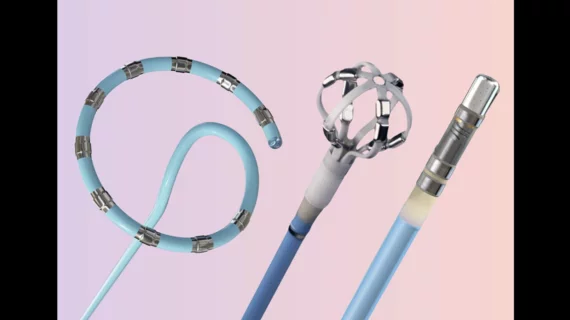Biosense Webster shares latest data on its pulsed field ablation system
Biosense Webster, part of Johnson & Johnson MedTech, shared updated data on its Varipulse pulsed field ablation (PFA) system at AF Symposium 2024 in Boston, highlighting the technology’s potential to treat atrial fibrillation (AFib).
PFA uses electric pulses to open holes in cell membranes and cause cell death in targeted tissue, as opposed to extreme temperatures. It has been gaining significant momentum in the United States. Both Medtronic’s PulseSelect and Boston Scientific’s Farapulse gained U.S. Food and Drug Administration (FDA) approval in recent months, and other vendors are working to receive a go-ahead for their own PFA systems.
Biosense Webster shared encouraging data from two separate clinical trials with attendees in Boston: the inspIRE and admIRE studies. Both trials were performed using the complete Biosense Webster Varipulse platform, which includes the Varipulse catheter, Trupulse generator and Carto 3 System service pack software.
“Biosense Webster is committed to bringing forward a versatile, differentiated portfolio of PFA solutions designed to help electrophysiologists deliver safe, effective, and efficient cardiac ablation procedures,” Jasmina Brooks, president of Biosense Webster, said in a prepared statement. “The encouraging outcomes from clinical trials with Varipulse fuel our excitement as we continue to deliver innovations to meet the diverse needs and ablation strategies required to successfully treat atrial fibrillation.”
The inspIRE clinical trial
The inspIRE trial focused on the Varipulse’s safety and effectiveness in 186 patients treated in Europe or Canada from March 2021 to May 2022. Overall, 80% of participants receiving optimal PFA care were free of atrial arrhythmia recurrence after 12 months. Also, treatment was linked to a median fluoroscopy time of 7.8 minutes and zero adverse events.
“High efficacy of 80% freedom from atrial recurrence at 12 months and a strong safety profile are promising evidence of the capabilities of the Varipulse platform,” corresponding author Vivek Y. Reddy, MD, director of electrophysiology at the Mount Sinai Fuster Heart Hospital and a professor at the Icahn School of Medicine at Mount Sinai, said in the Biosense Webster statement.
The admIRE clinical trial
The admiRE trial was a pilot study focused on the platform’s safety and effectiveness in 20 patients treated in the United States. While 80% were free from atrial recurrence after 12 months, the median fluoroscopy time was 3.5 minutes.
“These initial results are encouraging and demonstrate the potential for the Varipulse platform to become a key component of the suite of tools electrophysiologists have at their disposal to perform catheter ablations,” David Newton, MD, an electrophysiologist with Memorial Health University Medical Center, explained.

